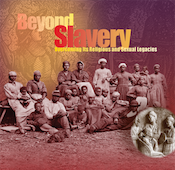Beyond Slavery
Explore the Conference
Explore the Conference by Subject
Slavery in Christian, Jewish, and Muslim Scripture and Religious Law
Christianity, Religion of the Slaveholders and the Enslaved
Sexual Assault and Exploitation Under U.S. Slavery and Jim Crow
How Slavery Has Shaped Our Understandings of Marriage and Friendship
Slavery, Violence, and the State
Beyond Slavery:
Overcoming Its Religious
& Sexual Legacy
Bernadette Brooten:
Sexual Ethics Untainted
by Slaveholding Values
Slavery and slaveholding values are deeply disturbing and pervasive realities within the modern world. Yet, religious and non-religious people can create sexual ethics free of the slaveholding values of ownership, domination, control, obedience, and subordination; indeed, they are already on the way to doing that.
Facing up to our religious and national histories of slavery is the first step. Religious toleration of slavery demonstrates the grave dangers of scriptural literalism and of using religious scripture as an absolute basis for law or public policy.
Religious communities can work to undo slavery's long-term effects by examining the grave moral problems of having ignored the sexual exploitation of enslaved persons, the control of enslaved women's reproduction, and the breaking up of families. They can help their members to be fair-minded jurors by developing religious arguments against harmful racial and sexual stereotypes.
Everyone can help to create the conditions for meaningful consent to sexual relations by promoting economic justice, without which marginal persons are vulnerable to sexual coercion. We can all think critically about the stories that we tell about others and ourselves, because these stories shape our moral imaginations and influence our behavior.
We can promote reparations for slavery and legal segregation, including reparations for the sexual harms and harms to families inflicted in these periods. The African American community has tirelessly worked for reparations since the nineteenth century, but has never been in the social position to obtain them. Reparations are long overdue, can come in many forms, and can promote racial reconciliation, including in the area of sexuality.
We can work to prevent further harm by ending all forms of slavery today, whether sexual, agricultural, industrial, or domestic. In addition, religious communities and society as a whole can eradicate the longstanding linkage between marriage and slavery by transforming our understanding of marriage from ownership and control to partnership and shared responsibility. By all of these means, we can create the material, social, and spiritual conditions for sexual intimacies that are consensual, mutual, responsible, and pleasurable.
This video was recorded on October 15-16, 2006 as part of the conference, "Beyond Slavery: Overcoming Its Religious and Sexual Legacy." It was sponsored by the Feminist Sexual Ethics Project in the Near Eastern and Judaic Studies Department at Brandeis University.
